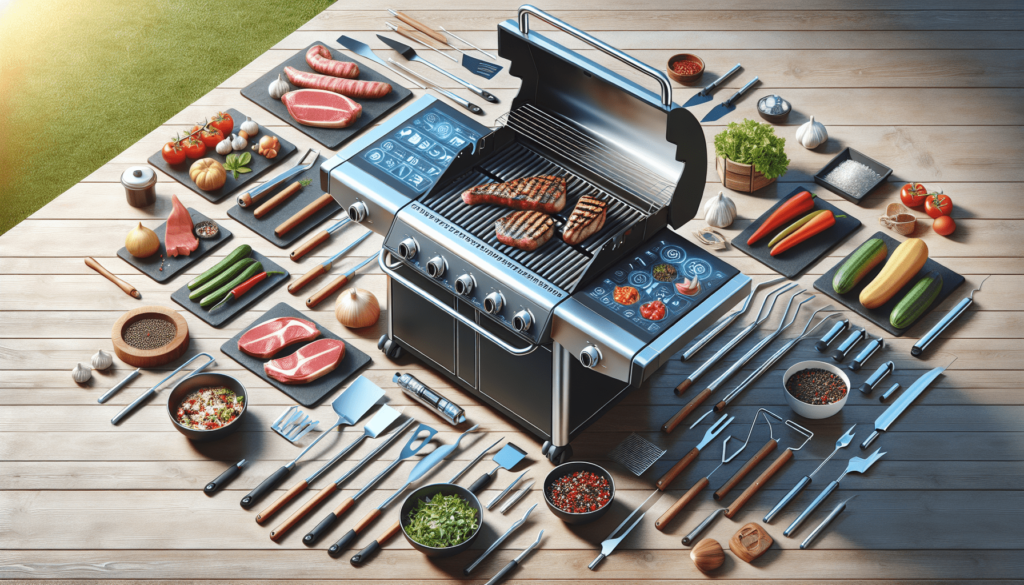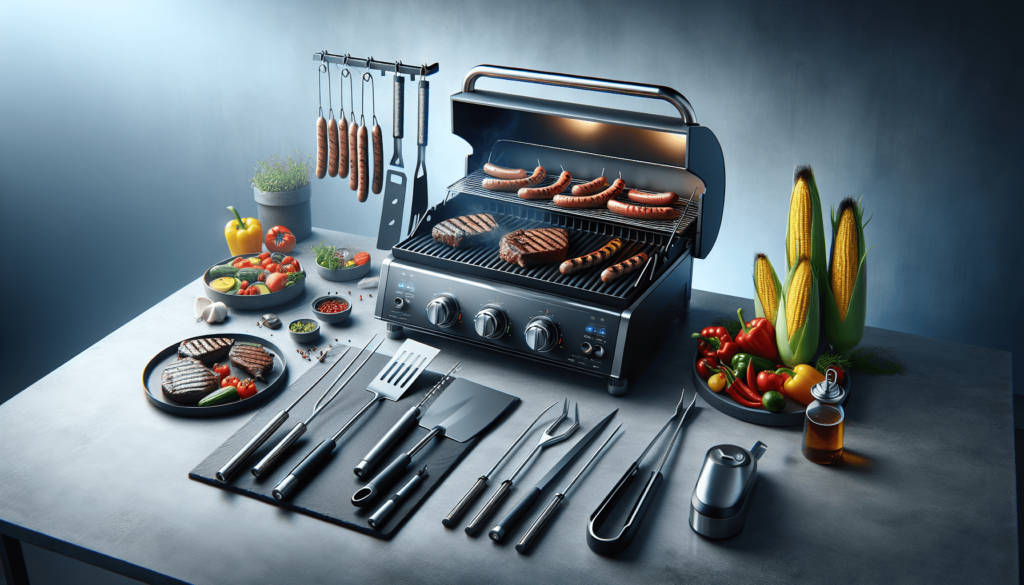Are you tired of waiting ages for your food to cook on the grill? Well, look no further! In this article, you will discover 10 essential grilling hacks that will revolutionize your outdoor cooking experience. These hacks are guaranteed to not only save you time, but also enhance the delicious flavors of your grilled creations. From using aluminum foil to prevent flare-ups to strategically placing charcoal for optimal heat distribution, these simple yet effective tips will have you grilling like a pro in no time. So grab your apron and fire up the grill, because faster and tastier meals await!

Preheat the grill
Turn on the grill and preheat it for at least 10-15 minutes before cooking to ensure it reaches the desired temperature.
Preheating also helps to sterilize the grill and prevent food from sticking.
Preheating your grill is an essential step in the grilling process. By turning on the grill and allowing it to preheat for at least 10-15 minutes, you ensure that it reaches the desired temperature before placing your food on the grates. This step is crucial because it allows the grill to sterilize, killing off any bacteria or contaminants that may have been left behind from the previous cooking session. Additionally, preheating helps to prevent food from sticking to the grill grates, making the grilling process smoother and more enjoyable.
Clean the grill grates
Brush the grates with a grill brush to remove any leftover food particles, grease, or debris from previous cooking sessions.
Clean grates result in better heat distribution and prevent food from sticking.
You can also use an onion or aluminum foil to clean the grates if you don’t have a grill brush.
Before you start grilling, it’s important to clean the grill grates thoroughly. By using a grill brush, you can easily remove any leftover food particles, grease, or debris that may be stuck to the grates from previous cooking sessions. This step is crucial because clean grates allow for better heat distribution, ensuring that your food cooks evenly and receives that delicious smoky flavor. Additionally, cleaning the grates helps prevent food from sticking, making it easier to flip and remove your food once it’s cooked to perfection. In case you don’t have a grill brush on hand, you can also use an onion or aluminum foil to clean the grates. Simply cut an onion in half and rub it on the grates, or crumple up aluminum foil and use it to scrub away any residue.
Oil the grill grates
Use a clean cloth or paper towel dipped in oil and rub it on the grill grates before cooking.
Oiling the grates prevents food from sticking and helps achieve those beautiful grill marks on your food.
Once you have cleaned the grill grates, it’s time to oil them before cooking. Using a clean cloth or paper towel, dip it in oil and rub it thoroughly over the grates. This step is important because it creates a non-stick surface, preventing your food from sticking to the grates while grilling. Furthermore, oiling the grates helps to achieve those beautiful grill marks that make your food look even more appetizing. The oil also adds a subtle flavor to your food, enhancing the overall taste of your grilled dishes.
Marinate your meat
Marinating your meat not only enhances its flavor but also helps tenderize it and reduces cooking time.
Allow the meat to marinate for at least 30 minutes to a few hours before grilling for the best results.
One of the best ways to elevate the flavor of your grilled meat is to marinate it beforehand. Marinating not only enhances the taste but also helps to tenderize the meat and reduce cooking time. The marinade, a mixture of flavorful ingredients such as herbs, spices, oils, and acids like vinegar or citrus juice, penetrates the meat and infuses it with delicious flavors. To achieve the best results, allow your meat to marinate for at least 30 minutes to a few hours before grilling. This gives the flavors a chance to develop and ensures that the meat is tender and juicy when cooked.

Choose the right cuts of meat
Opt for thin cuts of meat like steaks, chops, or chicken breasts, which cook faster on the grill.
Thicker cuts will take longer to cook, so adjust the grilling time accordingly.
When it comes to grilling, choosing the right cuts of meat can make a significant difference in the cooking process. Opting for thin cuts of meat, such as steaks, chops, or chicken breasts, is ideal as they cook faster on the grill. Thin cuts allow for quicker and more even cooking, as they are more likely to reach the desired internal temperature without becoming overcooked or dry. On the other hand, thicker cuts of meat will take longer to cook, so it’s important to adjust the grilling time accordingly. By selecting the appropriate cuts of meat for grilling, you ensure that your food is cooked to perfection, resulting in a delicious and satisfying meal.
Use direct and indirect heat zones
Create a direct heat zone by placing charcoal or turning on burners on one side of the grill.
This zone is ideal for searing meats and creating grill marks.
Use the other side of the grill, where there are no flames or hot coals, for indirect heat cooking like slow roasting or cooking delicate foods.
Understanding how to use direct and indirect heat zones on your grill can greatly enhance your grilling experience. To create a direct heat zone, you can either place charcoal or turn on burners on one side of the grill. This zone is ideal for searing meats and creating those coveted grill marks that add visual appeal to your dishes. By placing the food directly over the flames or hot coals, you achieve a high heat that sears the outside of the meat, locking in the juices and creating a delicious crust.
On the other hand, the other side of the grill, where there are no flames or hot coals, is perfect for indirect heat cooking. This method involves cooking the food away from the direct heat source, allowing for slower, more controlled cooking. Indirect heat is excellent for slow roasting larger cuts of meat or cooking delicate foods that require more gentle heat. By utilizing both direct and indirect heat zones, you have more control over the cooking process, ensuring that your food is cooked to perfection.
Lid on or off
Use the lid to trap heat and cook food faster, especially for thicker cuts or when using indirect heat.
Keep the lid off when grilling thin cuts or when you want to sear your meat quickly.
The decision of whether to keep the lid on or off while grilling depends on the type of food and cooking method you are using. In general, using the lid helps to trap heat within the grill, creating a more efficient cooking environment. This is especially useful when cooking thicker cuts of meat or when utilizing indirect heat for slow roasting. By keeping the lid on, you retain the heat and create a convection effect, which helps to cook the food faster and more evenly.
However, there are instances when it is best to keep the lid off. When grilling thin cuts of meat or when you want to quickly sear your meat, leaving the lid off allows for a faster cooking process. The absence of the lid promotes direct heat on the food, giving it that desirable charred exterior while maintaining a juicy interior. Remember to always monitor the food closely when grilling with the lid off to avoid overcooking or burning.
Use a meat thermometer
Invest in a meat thermometer to ensure your food is cooked to the desired doneness.
Insert the thermometer into the thickest part of the meat, away from bones, and cook until it reaches the recommended internal temperature.
Using a meat thermometer is a foolproof way to ensure that your food is cooked to perfection. Investing in a quality thermometer allows you to accurately measure the internal temperature of the meat, giving you the confidence to serve delicious and safe meals. When using a meat thermometer, insert it into the thickest part of the meat, away from any bones, as bones can affect the reading. Cook the meat until it reaches the recommended internal temperature for the specific type of meat you are grilling. This ensures that your meat is cooked to the desired doneness, whether it’s rare, medium, or well-done.
Let meat rest before serving
After grilling, let your meat rest for a few minutes before cutting or serving.
Resting allows the juices to redistribute, resulting in juicier and more flavorful meat.
After removing your meat from the grill, it’s important to let it rest for a few minutes before cutting or serving. Resting allows the juices within the meat to redistribute, resulting in juicier and more flavorful meat. When meat is cooked, its juices are concentrated in the center. By allowing the meat to rest, these juices have a chance to spread evenly throughout the meat, ensuring that each bite is tender and full of flavor. While it may be tempting to immediately dig in, practicing patience and allowing your meat to rest will greatly enhance the overall dining experience.
Keep the grill clean
Regularly clean your grill after each use to prevent buildup and ensure optimal performance.
Remove ashes, clean the grates, and wipe down the exterior to keep your grill in great condition.
To maintain the performance and longevity of your grill, it’s important to regularly clean it after each use. Cleaning your grill prevents the buildup of residue, grease, and ash, ensuring that it continues to function optimally. After each grilling session, remove any ash from the bottom of the grill and clean the grates thoroughly. This can be done using a grill brush, onion, or aluminum foil as mentioned earlier. Additionally, wipe down the exterior of the grill to remove any splatters or grease. By keeping your grill clean, you not only ensure that it remains in great condition but also promote better-tasting food and a more enjoyable grilling experience.
In conclusion, these ten essential grilling hacks for faster cooking will help you become a grill master in no time. From preheating the grill and cleaning the grates to oiling them and using direct and indirect heat zones, each step plays a crucial role in achieving delicious and perfectly cooked meals. Remember to marinate your meat, choose the right cuts, and use a meat thermometer for precise cooking. Let your meat rest before serving, and don’t forget to keep your grill clean for optimal performance. With these tips in mind, get ready to enjoy mouthwatering grilled dishes that will impress your family and friends all summer long!
